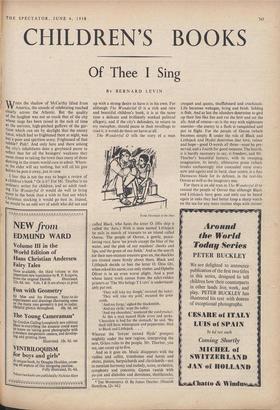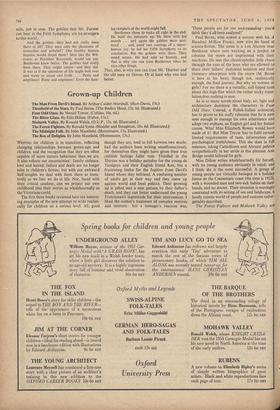CHILDREN'S BOOKS
Of Thee I Sing
By BERNARD LEVIN WHEN the shadow of McCarthy lifted from America, the sounds of celebrating reached clearly across the Atlantic. But the quality of the laughter was not so much that of the city Whose siege has been raised in the nick of time as the nervous, high-pitched guffaws of the gar- rison which can see by daylight that the enemy force, which had so frightened them at night, was but a poor and spiritless army. Frightened of that rabble? Pish! And only here and there among the city's inhabitants does a greybeard pause to reflect that for all the besiegers' weakness they came closer to taking the town than many of those dancing in the streets would care to admit. Where- at the elder will say nothing, but will oil his gun before he puts it away, just in case. I fear this is not the way to begin a review of a children's book.* Or is it? For Mr. Thurber is no ordinary writer for children, and an adult read- ing The Wonderful 0 would do well to bring More to the book than a wish to find out which Christmas stocking it would go best in. Indeed, be would be an odd sort of adult who did not end up with a strong desire to have it in his own. For although The Wonderful 0 is a rich and rare and beautiful children's book, it is at the same time a delicate and brilliantly worked political allegory, and if the city's defenders, to return to my metaphor, should pause in their revellings to read it, it would do them no harm at all. The Wonderful 0 tells the story of a man
From Threshold of the Stars
called Black, who hates the letter 0. (His ship is called the Aeiu.) With a man named Littlejack he sails in search of treasure to an island called Ooroo. The people of Ooroo, a gentle, peace- loving race, have 'no jewels except the blue of the water, and the pink of our maidens' cheeks and lips, and the green of our fields.' And as the search for their non-existent treasure goes on, the shackles are riveted more firmly about them. Black and Littlejack decide to ban the letter 0. Otto Ott, when asked his name, can only stutter, and Ophelia Oliver is in an even worse plight. And a poet whose latest work comes from the edict-ridden printers as `The Mn beings T Lvers' is understand- ably put out. `They will fake my dough,' moaned the baker. `They will take my gold,' moaned the gold- smith.
`And my forge,' sighed the blacksmith. `And my cloth,' wept the tailor. `And my chocolate,' muttered the candymaker. At this a man named Hyde arose and spoke. `Chocolate is bad for the stomach,' he said. 'We shall Still have wintergreen and peppermint. Hail to Black and Littlejack. . . Whereat the `lawyer named Hyde' prospers mightily under the new regime, interpreting the new, 0-less rules to the people. Mr. Thurber, you see, can count up to five. And so it goes on. Music disappears with the violins and cellos, trombones and horns and oboes, pianos, harpsichords and clavichords—not to mention harmony and melody, score, orchestra; symphony and concerto. Games vanish with yo-yos and diabolos and dominoes, shuttlecocks,
* THE WONDERFUL O. By James Thurber. (Hamish Hamilton, 12s. 6d.) croquet and quoits, shuffleboard and crochinole. Life becomes webegne, bring and brish. Schling is flush. And at last the islanders determine to gird up their lins like lins and rut the hrrr and ust the afs. And of course—as is the way with nightmare enemies—the enemy in a flash is vanquished and put to flight. For the people of Ooroo (which becomes simply R under the rule of Black and Littlejack and Hyde) determine .that love, valour and hope—good 0-words all three—must be pre- served, and a fourth for good measure. The fourth, it is hardly necessary to say, is freedom, and Mr. Thurber's beautiful fantasy, with its sweeping imagination, its lovely, alliterative prose (which breaks enchantingly into concealed verse every now and again) and its hard, clear centre, is a fine Damascus blade for its defence, in the real-life Ooroo as well as the imaginary one. For there is an old man in The Wonderful 0 to remind the people of Ooroo that although Black and Littlejack have gone and owls can be heard again in oaks they had better keep a sharp watch on the sea for any more sinister ships with sinister _
sails, just in case. The goblins that Mr. Forster can hear in the Fifth Symphony are no strangers to this world : And the goblins—they had not really been there at all? They were only the phantoms of cowardice and unbelief? One healthy human impulse would dispel them? Men like the Wil- coxes, or President Roosevelt, would say yes. Beethoven knew better. The goblins had really been there. They might return—and they did. It was as if the splendour of life might boil over and waste to steam and froth. . . Panic and emptiness! Panic and emptiness! Even the flam- ing ramparts of the world might fan. Beethoven chose to make all right in the end. He built the ramparts up. He blew with his mouth . . . and again the goblins were scat- tered . . . and, amid vast roarings of a super- human joy, he led his Fifth Symphony to its conclusion. But the goblins were there. They could return. He had said so bravely, and that is why one can trust Beethoven when he says other things.
That, also, is why one can trust Mr. Thurber and the old man on Ooroo. Or at least why one had better.











































 Previous page
Previous page